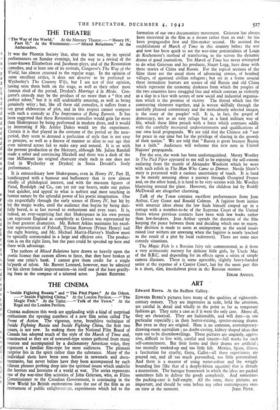THE THEATRE
" The Way of the World." At the Mercury Theatre.--" Henry IV, Part II." At the Westminster.—" Mixed Relations." At the Ambassadors.
IT was the Phoenix Society that, after the last war, by its special performances on Sunday evenings, led the way to a revival of the lesser-known Elizabethan and Jacobean-plays, and of the Restoration comedies, and at least one of its revivals, Congreve's The Way of the World, has almost returned to the regular stage. In the opinion of some excellent critics, it does not deserve to be preferred to Wycherley's The Country Wife, but I am not of that opinion, having seen them both on the stage, as well as their other most famous rival of the period, Dryden's Marriage a la Mode. Con- greve's comedy may be the product of no more than a " thin and perfect talent," but it is still undeniably amusing, as well as being genuinely witty ; but, like all these old comedies, it suffers from a too great elaboration of plot, and in this respect cannot compare with such a comedy as The Importance of Being Earnest. It has been suggested that these Restoration comedies would gain far more than Shakespeare by being performed in modern dress, and it would be interesting if Mr. Ashley Dukes would try the experiment. Certain it is that played in the costume of the period or the near- period, they seem to demand a perfection of style that is not easy to procure, as well as a finesse of manner so alien to our age that even talented actors fail to make easy and natural. It is so with the present production at the Mercury, although Mr. Julian Randall made a sober and convincing Mirabell and there was a dash of the true Millamant (an original character study such as one does not find in Wycherley or Dryden) in Sonia Dresdel's lively performance.
It is extraordinary how Shakespeare, even in Henry IV, Part II, handicapped with a humour and buffoonery that is now almost wholly of philological interest, and with the museum figures of Pistol, Bardolph ...nd Co., can yet stir our hearts, make our pulses beat quicker, and appeal to what is noblest and most touching in human nature by the splendid power of his poetic imagination. One sits respectfully through the early scenes of Henry IV, but bit by bit the magic works, until the audience that begins by being duti- fully bored, is at last moved to enthusiasm and even tears. It is, indeed, an ever-surprising fact that Shakespeare in his own person can represent England as completely as Greece was represented by its four greatest dramatists. Mr. Robert Atkins maintains his excel- lent representation of Falstaff, Tristan Rawson (Prince Henry) had the right bearing, and Mr. Michael Martin-Harvey's Shallow must be specially commended in a large and efficient cast. The produc- tion is on the right lines, but the pace could be speeded up here and there with advantage.
The authors of Mixed Relations have drawn so heavily upon the poetic licence that custom allows to farce, that they have broken at least one critic's bank. I cannot give them credit for a single ha'porth of talent. Mr. Barrett Lennard, however, may be admired for his clever female impersonation—in itself one of the least gratify-
ing feats in the compass of a talented actor. JAMES REDFERN.


























 Previous page
Previous page